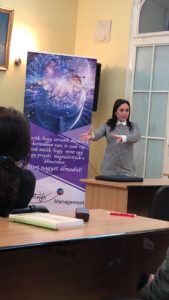As part of a successful project, our first fieldwork was in Romania, where we were invited to the Babeș–Bolyai University of Science.
On 14. March, after a rather tiring travel, we arrived in Kolozsvár, where the warm welcome became a wonderful start to the positive tone of the day.
The unification of the Romanian-speaking and Hungarian-speaking universities of Kolozsvár was done in 1959. After this, the institution was renamed to Babeș–Bolyai University of Science, and holds this name even this day. Meanwhile, the Babeș–Bolyai University of Science became the symbol of success for both Kolozsvár and the entire country. It is an alive, dynamic, and constructive institution, which properly integrate into the society, while keeping its gaze on the future, which it can plan, prepare, and construct.
Wherever the personal and financial conditions make it possible, the educational staff of the Hungarian-speaking Institute or Faculty involves the PhD students and university students in creating separate research groups, research centres, and research institutions, which aim to realise research projects which can be integrated into the educational activity. Apart from this, a major dealing with evaluating programs of the project management and civil service sector also got a place on their wide educational portfolio, hosted by the Faculty of Political-, Civil service-, and Communication Sciences. This clearly proves the fact that educating project management knowledge has a right to exist, both in Hungary and in other countries.

This also proved that the project named << PLM- project-based life management >> realised as part of the tender dubbed “Transnational co-operations”, project number EFOP-5.2.2-17 offers an opportunity for constructive cooperation between the Babeș–Bolyai University of Science and the EUROPÉER Foundation.
The goal of the first professional meeting, apart from discussing the details of the tender cooperation, was to introduce the Project Life Management program, and increase its popularity.
As part of a professional presentation, we were asked to introduce the program in detail, and to spread currently collected scientific results. The presentation was held by the program’s spiritual parent and leader, Györgyi Lakatosné Szuhai. The open-mindedness of the audience, and the exceptional interest in the program were both proven during the two-hour interactive discussion after the presentation.
The first successful professional cooperation with the Romanian partner gave a new incentive to further develop the program, and to spread project-based life management as widely as possible, as positive feedback, being open towards cooperation, and the general interest about the program all prove that it is successful.

